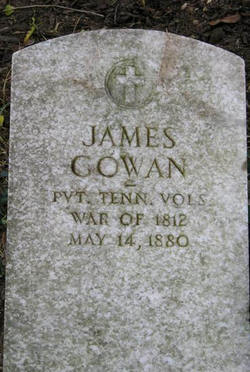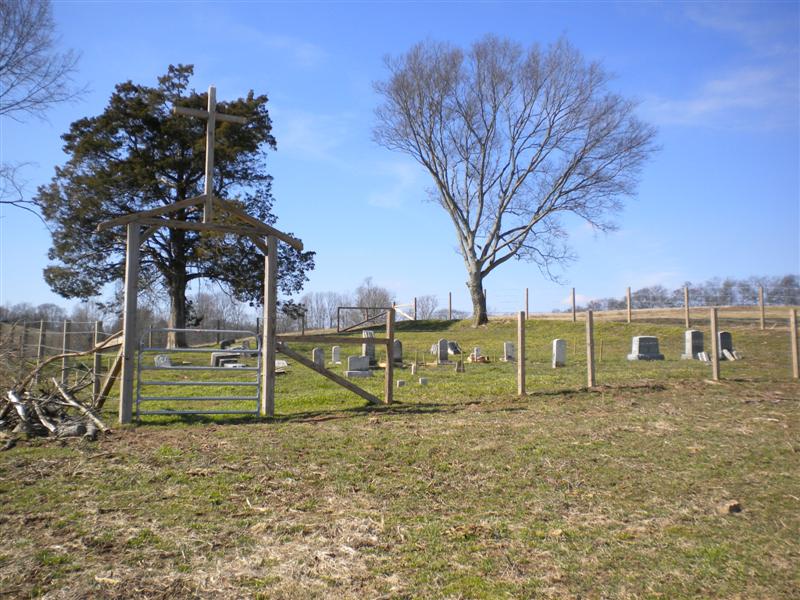Born in the State of Virginia in 1785. In conjunction with several others, he left Old Dominion in the early part of the century and headed West. After suffering considerably from exposure, he finally reached Middle Tennessee camping on the banks of Harpath River. Here he spent the following year hunting and trapping after which he moved to Bedford County. Following an Indian trail he passed over the present site of Shelbyville, killing a deer about where the Courthouse now stands.
Going ten miles further South, he entered a large tract of land at twelve 1/2 cents per acre, living on the same tract until he died.
James Burns Gowen volunteered to fight with Gen. Andrew Jackson on every occasion that the Tennessee militia took to the field. Following the massacre at Ft. Mimms, Alabama by the Creek Indians, Jackson, a Nashville lawyer, called for volunteers to rendezvous at Fayetteville, Tennessee. James Burns Gowen and a couple of his Mulberry Creek neighbors by the names of Davey Crockett and Sam Houston joined up September 24, 1813 in Capt. William Locke's company with about 2,000 other Tennesseeans. Jackson arrived October 7 to take command, his arm still in a sling from a wound he received a month earlier in a pistol duel at Nashville.
He ordered the militia into Alabama to teach the Creeks, then allied with the British, a lesson. They headed south, traversing a primeval territory with no roads and no bridges. James Burns Gowen recalled how he used his saddle to swim across the Tennessee River. James Jefferson Gowen, a son, retained the saddle for many years later as a momento. They took on the Creeks, the Seminoles and the Baton Rouge [Red Sticks] and defeated them decisively at Tallushatchee and Talledega.
Jackson called his Tennesseeans together in the following spring to finish the job. On March 28, 1814, the Creeks were finally crushed in the Battle of Horseshoe Bend. James Burns Gowen related that in the battle, while he was squatting down behind a tree, an Indian spied him and fired his musket. The ball glanced off the tree, showering powdered bark into his face. While blinded, Gowen raised his gun and fired. When his eyes cleared, he found to his surprise, "another good Indian" lying on the ground before him.
From Alabama the campaign moved to Pensacola to engage the British. When they learned that the main objective of the British was New Orleans, they marched overland to Louisiana, arriving in time to participate in the battle January 8, 1815 where the Americans overwhelmingly defeated the British. The "Eighth of January," a ballad reciting the exploits of the Americans under Jackson in the last battle of the war, was a favorite of James Burns Gowen thereafter.
Ezekial Alexander stated that he fought with Davey Crockett and James Burns Gowen in the Battle of Horseshoe Bend and the Battle of New Orleans, according to the research of Sarah L. Hollingsworth, a descendant of Ezekiel Alexander and Winna Gowan Alexander of South Bend, Indiana in 1998. Winna Gowan Alexander was the daughter of Isaac Gowan and Cleta Gowan. This is the first indication that James Burns Gowen fought in the Battle of New Orleans.
James Burns Gowen lived as a neighbor to Davey Crockett for about 20 years, according to William Floyd, son-in-law to James Burns Gowen. He described Crockett as an "itchy-footed sort of fellow who went bear hunting with a knife, bagged a covey of wild turkey with a single shot, went Indian hunting with Andrew Jackson and finally got himself elected to Congress."
In their hunting days he and Davy Crockett were boon companions and many times pulled bones together from roasted bear ribs, seated over their camp fires, with no other companions except their trusty rifles and faithful dogs.
He was a great sportsman in his time and kept up his regular fishing days until a few weeks before his death.
Full of humor, a great joker, and a good neighbor, always charitable and for the above characteristics, he was loved and revered by all who knew him.
Known to all as "Uncle Jimmie", he lived to see his fourth generation. His once iron but now lifeless form, gently rests beneath the boughs of a giant cedar on his farm, the tender plant of which he nourished in its infancy, and carefully watched it for the last seventy years, looking forward to the time when it should shelter his last resting place.
(excerpts of this bio taken from "Uncle Jimmie's Eulogy written by a Grandson)
Children born to James Burns Gowen and Annie Price Gowen include:
Elizabeth Gowen born December 11, 1808
Shadrach Gowen born February 2, 1810
Harriet Gowen born November 13, 1811
Matthew Price Gowen born May 14, 1814
Annie Gowen born December 26, 1817
Sarah R. Gowen born May 22, 1823
William Price Gowen born November 22, 1824
Thomas Richard Gowen born September 17, 1828
Children born to James Burns Gowen and Lucy Emory Gowen include:
Annie Gowen [second] born February 26, 1842
Temperance Gowen born February 4, 1844
James Jefferson Gowen born December 28, 1847
Matilda Isbell Gowen born April 12, 1850
Isham Burns Gowen born May 8, 1852
Joseph F. Gowen born October 22, 1854
Franklin Gowen born in 1855
Frances Gowen born November 29, 1856
Laura Katherine Gowen born May 28, 1858
Benjamin Emory Gowen born March 14, 1860
Born in the State of Virginia in 1785. In conjunction with several others, he left Old Dominion in the early part of the century and headed West. After suffering considerably from exposure, he finally reached Middle Tennessee camping on the banks of Harpath River. Here he spent the following year hunting and trapping after which he moved to Bedford County. Following an Indian trail he passed over the present site of Shelbyville, killing a deer about where the Courthouse now stands.
Going ten miles further South, he entered a large tract of land at twelve 1/2 cents per acre, living on the same tract until he died.
James Burns Gowen volunteered to fight with Gen. Andrew Jackson on every occasion that the Tennessee militia took to the field. Following the massacre at Ft. Mimms, Alabama by the Creek Indians, Jackson, a Nashville lawyer, called for volunteers to rendezvous at Fayetteville, Tennessee. James Burns Gowen and a couple of his Mulberry Creek neighbors by the names of Davey Crockett and Sam Houston joined up September 24, 1813 in Capt. William Locke's company with about 2,000 other Tennesseeans. Jackson arrived October 7 to take command, his arm still in a sling from a wound he received a month earlier in a pistol duel at Nashville.
He ordered the militia into Alabama to teach the Creeks, then allied with the British, a lesson. They headed south, traversing a primeval territory with no roads and no bridges. James Burns Gowen recalled how he used his saddle to swim across the Tennessee River. James Jefferson Gowen, a son, retained the saddle for many years later as a momento. They took on the Creeks, the Seminoles and the Baton Rouge [Red Sticks] and defeated them decisively at Tallushatchee and Talledega.
Jackson called his Tennesseeans together in the following spring to finish the job. On March 28, 1814, the Creeks were finally crushed in the Battle of Horseshoe Bend. James Burns Gowen related that in the battle, while he was squatting down behind a tree, an Indian spied him and fired his musket. The ball glanced off the tree, showering powdered bark into his face. While blinded, Gowen raised his gun and fired. When his eyes cleared, he found to his surprise, "another good Indian" lying on the ground before him.
From Alabama the campaign moved to Pensacola to engage the British. When they learned that the main objective of the British was New Orleans, they marched overland to Louisiana, arriving in time to participate in the battle January 8, 1815 where the Americans overwhelmingly defeated the British. The "Eighth of January," a ballad reciting the exploits of the Americans under Jackson in the last battle of the war, was a favorite of James Burns Gowen thereafter.
Ezekial Alexander stated that he fought with Davey Crockett and James Burns Gowen in the Battle of Horseshoe Bend and the Battle of New Orleans, according to the research of Sarah L. Hollingsworth, a descendant of Ezekiel Alexander and Winna Gowan Alexander of South Bend, Indiana in 1998. Winna Gowan Alexander was the daughter of Isaac Gowan and Cleta Gowan. This is the first indication that James Burns Gowen fought in the Battle of New Orleans.
James Burns Gowen lived as a neighbor to Davey Crockett for about 20 years, according to William Floyd, son-in-law to James Burns Gowen. He described Crockett as an "itchy-footed sort of fellow who went bear hunting with a knife, bagged a covey of wild turkey with a single shot, went Indian hunting with Andrew Jackson and finally got himself elected to Congress."
In their hunting days he and Davy Crockett were boon companions and many times pulled bones together from roasted bear ribs, seated over their camp fires, with no other companions except their trusty rifles and faithful dogs.
He was a great sportsman in his time and kept up his regular fishing days until a few weeks before his death.
Full of humor, a great joker, and a good neighbor, always charitable and for the above characteristics, he was loved and revered by all who knew him.
Known to all as "Uncle Jimmie", he lived to see his fourth generation. His once iron but now lifeless form, gently rests beneath the boughs of a giant cedar on his farm, the tender plant of which he nourished in its infancy, and carefully watched it for the last seventy years, looking forward to the time when it should shelter his last resting place.
(excerpts of this bio taken from "Uncle Jimmie's Eulogy written by a Grandson)
Children born to James Burns Gowen and Annie Price Gowen include:
Elizabeth Gowen born December 11, 1808
Shadrach Gowen born February 2, 1810
Harriet Gowen born November 13, 1811
Matthew Price Gowen born May 14, 1814
Annie Gowen born December 26, 1817
Sarah R. Gowen born May 22, 1823
William Price Gowen born November 22, 1824
Thomas Richard Gowen born September 17, 1828
Children born to James Burns Gowen and Lucy Emory Gowen include:
Annie Gowen [second] born February 26, 1842
Temperance Gowen born February 4, 1844
James Jefferson Gowen born December 28, 1847
Matilda Isbell Gowen born April 12, 1850
Isham Burns Gowen born May 8, 1852
Joseph F. Gowen born October 22, 1854
Franklin Gowen born in 1855
Frances Gowen born November 29, 1856
Laura Katherine Gowen born May 28, 1858
Benjamin Emory Gowen born March 14, 1860








